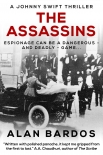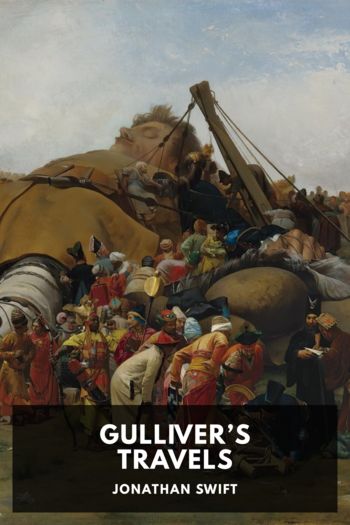The Assassins by Alan Bardos (best novels in english txt) 📗

- Author: Alan Bardos
Book online «The Assassins by Alan Bardos (best novels in english txt) 📗». Author Alan Bardos
'Yes, rather a fait accompli. I’m afraid,' Sir George grinned. 'Now take your medicine like a man. You know what happens to mortals who fly too close to the Gods.'
Sir George gave Johnny a dismissive wave and continued down the stairs. Johnny looked up at the domed ceiling; it reminded him of the City Hall in Sarajevo and the last time he’d seen Kati Weiz. He grinned - he had wanted a Belgium posting, after all. He followed Sir George down the stairs with a renewed swagger in his stride. He thought a few medals wouldn't hurt his prospects and he remembered that Libby was still in Paris.
Sir George stopped at the bottom of the great staircase, glorying at being at the heart of the British Empire, thanks to Johnny. 'Cheer up - you'll be home by Christmas.'
Johnny shrugged, 'I'll be glad to pay my respects to your wife on the way back and convey your regrets for leaving her in Paris.'
'You really are contemptible!' Sir George flushed with anger and pushed his way out onto the street, the open doors filling the hall with the sound of singing and cheering from the people outside.
Johnny walked over to the soldiers - it was time to take his medicine, once again.
Historical Notes
Following the trial of the conspirators in 1914, Danilo IIic, Misko Jovanovic and his friend, Veljko Cubrilovic were hanged.
Gavrilo Princip, Trifko Grabez and Nedeljko Cabrinovic were each sentenced to twenty years. All three died in Terezin's Small Fortress - Nedeljko Cabrinovic and Trifko Grabez in 1916, and Gavrilo Princip in April 1918. Most accounts agree that they died of tuberculosis and malnutrition.
Cvjetko Popovic was sentenced to 13 years. He was released after the First World War and became a teacher. Vaso Cubrilovic was sentenced to 16 years; he was also released after the war and became a history professor.
Milan Ciganovic joined up with Major Tankosic's company at the outbreak of the war, but was later sent to the USA by his government. He returned to Bosnia in 1919 and died in 1927.
Major Tankosic returned to active service and was mortally wounded in October 1915.
Colonel Dragutin 'Apis' Dimitrijevic finally lost his power struggle with Pasic, the Serbian Prime Minister, in 1917. He was accused of plotting to kill the Serbian regent and after a show trial in Salonika was executed, alongside Rade Malobabic.
Mehmed Mehmedbasic escaped the Austro-Hungarian authorities after the assassination, but was put on trial with Apis and was sentenced to six years. He later returned to Sarajevo and was killed during the Second World War.
Franz Janaczek remained with Sophie and Franz Ferdinand's children until his retirement. One of Sophie's sister's, Henriette, brought the children up and did her best to help them overcome the trauma of losing both their parents and the turbulent years of the First World War and its aftermath. The two boys, Ernst and Max, opposed the Nazis and were put in concentration camps - both survived. 'The Assassination of the Archduke', by Greg King & Sue Woolmans, has a particularly good account of what happened to the children.
The assassination of Archduke Franz Ferdinand was the pivotal event of the twentieth century. It led to the war which formed the modern world and resulted, as the assassins had hoped, in the end of the Habsburg Monarchy and for a period the creation of a South Slav state. However, there is still a certain amount of mystery around the events that led up to the assassination. This is largely a result of the clandestine nature of the people involved in the assassination, the conspirators’ attempts to mislead the investigation and the Austro-Hungarian Government's determination to prove Serbia's involvement in the assassination, while downplaying their own negligence.
Consequently, there are a number of grey areas in the history of the assassination, so I’ve used a certain amount of artistic license to fill in the gaps while trying to remain as historically accurate as possible with regards to the actions of the conspirators and the failure of the authorities to stop them.
There are two basic schools of thought about the origins of the assassination plot. Firstly, that it was Colonel 'Apis' Dimitrijevic's idea and that he planned it and recruited the assassins, through Major Tankosic. Secondly, that the assassination was purely the idea of the assassins and that Apis gave his support on a whim. There is however, no evidence to prove either case conclusively. What's known for sure is that the assassins were supported by Apis and his associates. Whether Apis conceived of the plot or just approved it, he made it possible for Gavrilo Princip to carry out the assassination.
The version of events depicted in this novel is an amalgam of the two perspectives, with the assassination conceived by the assassins as an act of 'tyrannicide', but with them lacking the means to change it from coffee shop talk into action. At the same time, Apis was looking to recruit people through Major Tankosic in order to carry out similar operations, and agreed to help.
There is also some debate as to whether or not Apis tried to stop the assassination, either when his government found out about the plan, or when he’d had a chance to reconsider his decision. Djuro Sarac was sent to Bosnia and met Danilo Ilic in mid June 1914. It's not known for sure where they met, or what they discussed, but Ilic's doubts about the assassination seem to have increased after the meeting and he spent the second half of June 1914 trying to persuade Gavrilo Princip not to carry out the act. It is possible that if a cancellation order was sent, it could have been an act of subterfuge, to fool the Serbian Prime Minister.
Following on from this, there is also a lot of speculation as to why Apis's master spy, Rade Malobabic, went to Sarajevo during the Archduke's





Comments (0)